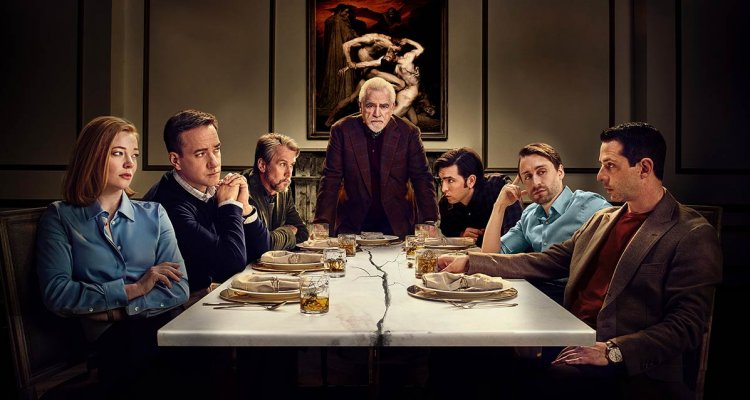Running the fifth largest media conglomerate in the world isn’t easy. It’s doubly difficult when at your feet are four different shades of ambitious, sometimes mercenary, children, heirs to your own throne, waiting impatiently, armed with daggers, for you to topple over. Such is the dilemma of Roy Media Empire and its ailing, but indomitable king Logan Roy (Brian Cox). Who will take the father’s place and solidify his legacy? The question loomed over every moment of Jesse Armstrong‘s terrific HBO drama “Succession” in Season 1, building towards an overzealous impasse in its finale.
READ MORE: The 50 Most Anticipated TV Shows & Mini-Series Of 2019
Intertwining a competitive, cutthroat, hyper-dysfunctional family into its corporate structure, “Succession”—acidic, sharp, ruthless, and ferocious in temperament and pace— expertly weaves lies, deceit, corporate corruption, and endless expostulation together.
READ MORE: The Best TV Shows & Mini-Series of 2018
Season 2 of “Succession” impressively picks up the pieces after Kendall’s (Jeremy Strong) betrayal and the aftermath of his dubious decisions last season. Enthralling, hilarious, tragic, and timely, “Succession” remains one of HBO’s strongest shows, boasting intelligent writing, riveting themes, and phenomenal performances from its ensemble.
In the eyes of the Roy children, there’s a fine and complicated line between hungering for the power that the empire’s control entails and that of their father’s unabashed love. Logan is an anesthetized, imprudent father who conflates the workplace performance and work ethic of his children with their capacity as worthy, decent human beings. For the children, this has created a simultaneous lifelong pursuit—impossibly toxic and unhealthy— to both please their father and a subconscious resentment towards them for not loving them the way they might have wished. “Succession” isn’t so much about a father searching for an heir to his empire, but rather, a story about four children yearning for their father’s calculated affection. That’s where the dramedy of errors flourishes. That is the heart and soul of the series. Betrayal is simply a natural byproduct of Logan’s neglect. Kendall’s affair of rendezvous with Logan’s competitor doesn’t seem as blasphemous in the context of analyzing the larger Roy family dynamics.
READ MORE: 10 TV Series To Watch In August: ‘Mindhunter,’ ‘Preacher,’ ‘Dark Crystal’ & More
Additionally, the series is thankfully interested in things beyond the notion of just succession. Armstrong layers in the threat of a corporate takeover through a proxy war as a result of Kendall’s betrayal to shake up the structure. The biggest hurdle for the Roy family to overcome isn’t necessarily the buyout, but themselves. They must put aside their interpersonal competitiveness and grudges to unify in order to defeat the external “antagonist.” The greater threat, however, has always been greed. Lust for wealth, material possession, power, and control. Ultimately, the traits that will lead one to self-destruct and implode.
The fierce performances haven’t skipped a beat either. In particular, Strong’s contrasted performance to that of his in Season one is nothing short of spectacular. Initially, an arrogant, ambitious, but shortsighted businessman often humiliated by the scalding words of this cruel father, Kendall is now just a beaten dog with his tail in between his legs. Strong portrays a man struggling with sobriety, strung out and defeated, each hallow word mumbled, heartbreakingly. Every ounce of his body language cowered and gentle. Each brief glance full of vacant apprehension. Still, Alan Ruck as the aloof eldest and lovable slacker of the Roy children, Connor, and Kieran Culkin as the Loki-esque trickster with a gleefully cynical and devious outlook on the world, will likely remain audience favorites.
If “Succession” falters anywhere in season two it’s in the lack of significant character development for some of its most important players. Although necessary to complicate the plot, Logan’s questionable health isn’t exactly character development. Furthermore, as the character with the least amount of screen time, Connor’s arc isn’t explored as much as it should be. However, new characters like Holly Hunter’s Rhea Jarrell, CEO of one of Logan’s rival companies, Pierce Media Group, and the Pierce family (the antithesis of the Roys), are introduced. Cold, blunt, witty, and hilarious, Rhea is a worthy, formidable pain in Logan’s neck. Yet, of the new cast, it’s Annabelle Dexter-Jones as Naomi Pierce who impresses the most. As Kendall’s familial equivalent, she makes a compelling partner-in-crime to further stir up the proverbial pot of shit stew that began brewing last season.
The lavish summer vacation home. Ceremonious dinners. Festive gatherings. Family hunting trips. Allusions to abusive pasts. Armstrong provides hints into the Roys’ past but doesn’t dive deep enough into the complex upbringing that created these aberrant dynamics. For a show that’s more about family than the inner-workings of a media conglomerate, “Succession” often doesn’t give viewers enough rhyme or reason as to why the characters behave the way they do to each other; other than suggesting a f*cked up upbringing. While some may enjoy playing detective, some of the inexplicable character behavior sometimes gets tiring.
Some of Armstrong’s attempts at remaining sociopolitically current (adding subtle commentary about white supremacy, leftist extremism, and even a public shooting subplot) tend to lean towards the side of tone-deaf rather than insightful or helpful to public discourse. What remains most topical about “Succession” is its commentary on embellished capitalism, extraneous political control over a corrupt media system, and the continued synonymy of white privilege with success in America and how that inevitably reverberates throughout and becomes engrained in the collective psyche of its people— often through said media, further enabling an unjustly skewed political, economic, and cultural system.
Although its second season may not attract many new viewers, fans of “Successions” relatively safe, creatively-speaking, first season will continue to enjoy its sophomoric iteration, intensifying and expounding upon many of the themes that made the show so memorable when it first aired. And Season two may not include a significant narrative departure from season one, but it is captivating and wildly amusing, nonetheless. [B]
“Succession” premieres Sunday, August 11 on HBO.

